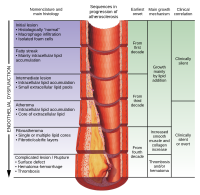
Photo from wikipedia
Background Emerging evidences suggest that the angiotensin receptor type 1 (AT1R) contributes heavily to the pathogenesis of atherosclerotic cerebral infarction (ACI). Herein, we examined a potential link between AT1R gene… Click to show full abstract
Background Emerging evidences suggest that the angiotensin receptor type 1 (AT1R) contributes heavily to the pathogenesis of atherosclerotic cerebral infarction (ACI). Herein, we examined a potential link between AT1R gene polymorphisms and ACI risk among a Southern Han Chinese population. Methods The rs3772616, rs275645, and rs377262 AT1R polymorphisms were genotyped in 689 ACI patients and 712 healthy controls, using the iMLDR-TM assay. Results The genotypic and allelic frequencies of AT1R rs3772616 differed tremendously between ACI patients and healthy controls, and the rs3772616 T allele is a risk allele for ACI. However, the rs275645 and rs377262 allelic and genotypic frequency distributions were comparable between ACI patients and controls. In addition, the G-T-T haplotype was linked to an enhanced risk of ACI. We, next, classified our study subjects based on environmental factors and revealed that the rs3772616 T allele was strongly associated with an elevated ACI risk in males, hypertensive individuals, and those over 65 years old. In addition, we observed a marked link between the rs3772616 T allele and enhanced AT1R levels. Conclusion Based on our research, there is a strong correlation between the AT1R rs3772616 polymorphism and enhanced ACI risk. Hence, the AT1R rs3772616 polymorphism can serve as a potential therapeutic target and bioindicator for ACI development.
Journal Title: Pharmacogenomics and Personalized Medicine
Year Published: 2022
Link to full text (if available)
Share on Social Media: Sign Up to like & get
recommendations!